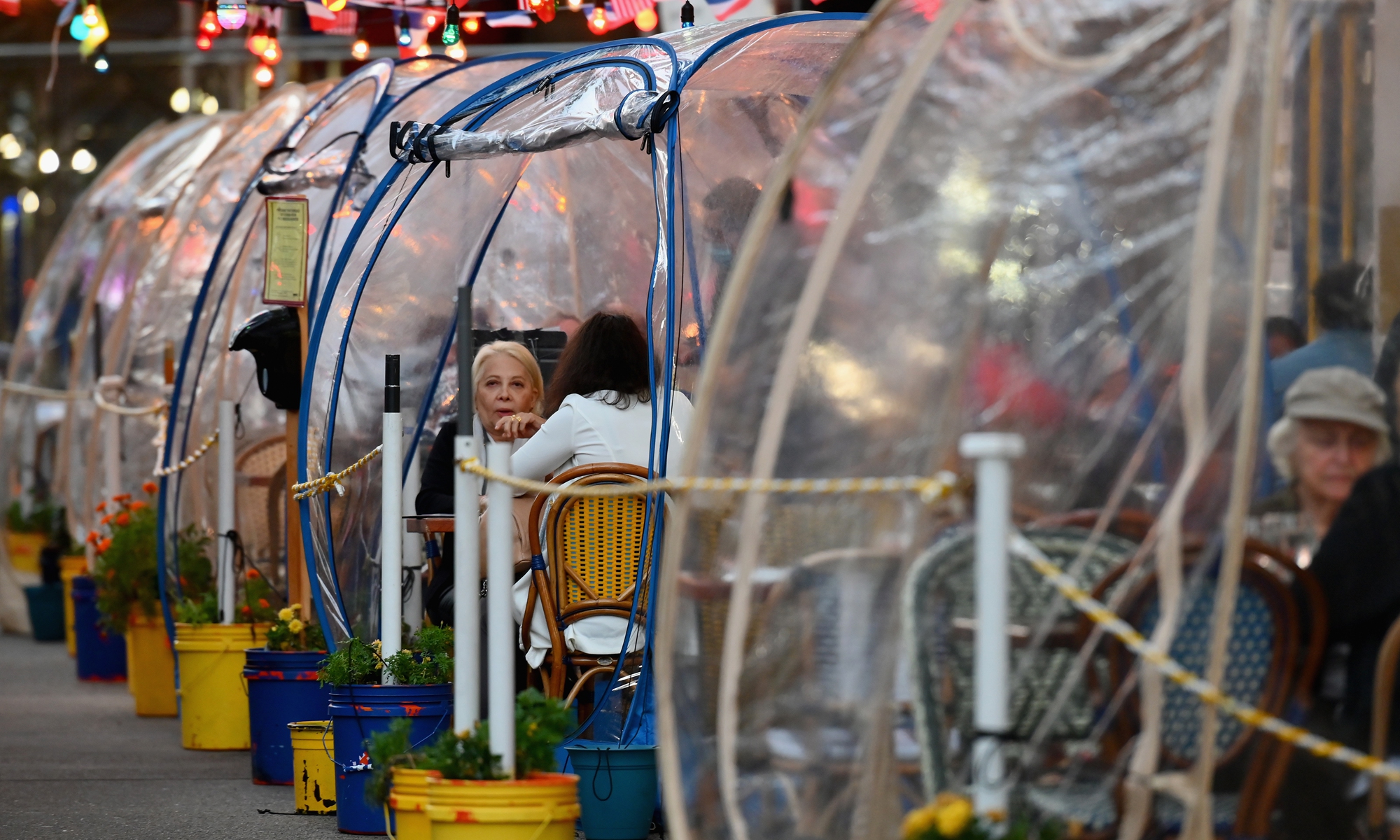Trump’s tacit approval of herd immunity blasted
By GT staff reporters Source: Global Times Published: 2020/10/16 21:58:40

People dine in plastic tents at a restaurant in Manhattan in New York City on Thursday, amid the coronavirus pandemic. Photo: AFP
As the total number of COVID-19 cases in the US is rapidly approaching eight million, the White House was reportedly embracing a declaration of herd immunity, drawing widespread criticism from scientists and experts who warned of more human losses in the US, if no urgent and concrete measures are taken to stop the virus before a peak season for flu and infectious diseases in the winter.
Discussions about herd immunity surfaced in the US after senior White House officials highlighted an online movement called the "Great Barrington Declaration," which favors herd immunity, NBC News reported on Thursday. In the declaration, a group of scientists argued that US authorities should allow the deadly coronavirus to spread among young, healthy people while protecting the elderly and vulnerable in order to reach herd immunity.
Herd immunity happens when enough of the population is immune to a disease, making it less likely to spread among the rest of the community. Some scientists think 60 percent to 80 percent of the population needs to be vaccinated or have natural antibodies to achieve herd immunity. No vaccines have been officially approved for the coronavirus so far.
The Trump administration appears to be tacitly adopting the herd immunity strategy, even though many in the US oppose it, Chen Xi, an associate professor of the Yale School of Public Health, told the Global Times on Friday.
Scientists who support herd immunity hope to put the elderly under quarantine, while allowing young people, who they think are a low-risk group for the coronavirus, go to work or school. That may sounds ideal, but the reality tells a different story - the theory cannot be implemented, as risks cannot be ruled out, Chen said.
The rate of standard diseases is quite high in the US even among young people, which means they remain at high risk of being infected with the novel coronavirus. Considering that 40 percent of young people suffer from obesity, there is no way for the US to get enough "safe" population contact with the virus to protect vulnerable groups, Chen said.
The herd immunity method has also been opposed for ethical concerns. It may be brought into the spotlight again out of concerns for the elderly, but it's still unfeasible, especially when vaccines are still unavailable, Huang Yanzhong, a senior fellow for global health at the US Council on Foreign Relations, told the Global Times.
Aside from some scientists, US President Donald Trump also seems to be fascinated with the idea that herd immunity could offer an easy end to the coronavirus pandemic. And the "neuroradiologist" Trump has brought in also argued that the rising cases in the US will bring the nation to herd immunity, US media reported.
However, Anthony Fauci, the country's top infectious disease expert, also slammed the plan for herd immunity.
Letting the coronavirus rip through the US population unchecked to infect as many people as possible to achieve so-called herd immunity would cause a lot of unnecessary deaths, and the idea is "nonsense" and "dangerous," Fauci was quoted by CNBC as saying on Thursday.
Although Trump and his campaign team tried to portray him as a "fighter of the virus" given his relatively quick recovery from the virus, he has never been an example of how normal COVID-19-infected individuals would experience, or be "immune" to the virus, experts said.
Yang Zhanqiu, deputy director of the pathogen biology department at Wuhan University, told the Global Times that Trump's quick "cure" for the virus is due to the most excellent medical conditions he enjoys as president. Although he is over 70 years old, he does not suffer from severe illnesses.
Trump is a special case, and his experience cannot be duplicated by others, Yang said.
Data from Johns Hopkins University shows that the US already had more than 7.98 million COVID-19 cases as of press time on Friday, with the number of deaths reaching 217,700.
The anti-virus measures in the US can be described as one slip at the beginning, followed by a series of mistakes. It has not turned into a national anti-virus strategy, not even to mention detailed prevention measures, Chen said, noting that when the COVID-19 epidemic rampaged in the US, no matter who wins the upcoming presidential election, the US needs a long time to get the situation under control.
Experts also warned that the winter season may see more infections in the US, considering cold weather helps the virus spread. That, on top of the flu season, could lead to a higher death rate.
Before the US, other countries have also discussed herd immunity. In March, UK scientists said herd immunity was an option that the government of Prime Minister Boris Johnson was exploring, as COVID-19 began taking a toll in the country. But his government soon abandoned the idea after receiving widespread criticism.
Sweden has also been trying to reach herd immunity, but the result is that the country now reportedly has the nine highest number of COVID-19 related death per capital in the world.
RELATED ARTICLES:
Posted in: DIPLOMACY